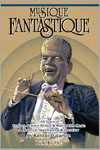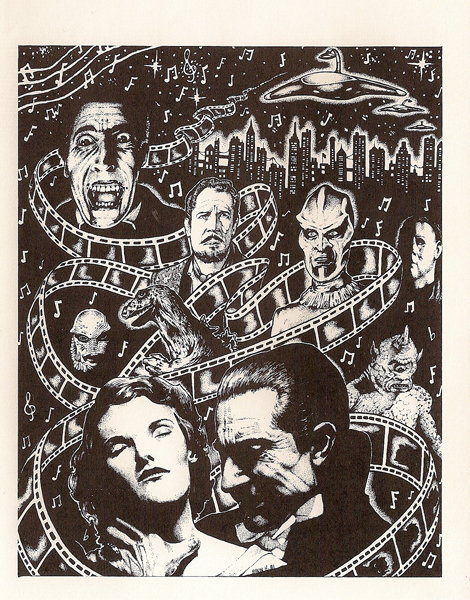August 10, 2018
The Story Behind STARLOG Records (from the author’s archives)
By Randall D. Larson
Published in CinemaScore #2 (newsletter format), March/April 1979 issue
[Some text has been edited to update details and fix errors in the original version]
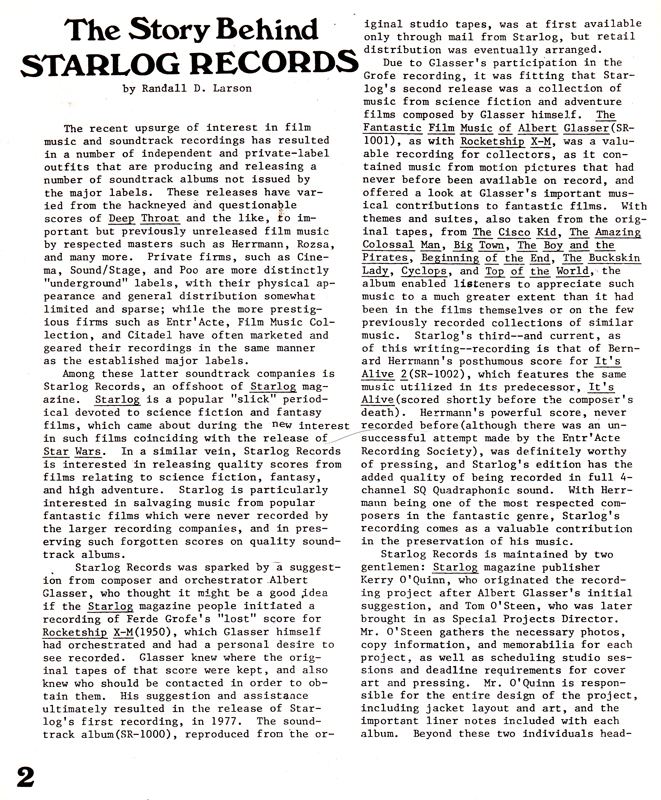 The recent upsurge in interest in film music and soundtrack recordings has resulted in a number of independent and private-label outfits that are producing and releasing a number of soundtrack LPs not issued by the major labels. These released have varied from hackneyed and questionable scores of DEEP THROAT and the like, to important but previously unreleased film music by respected masters such as Herrmann, Rózsa, and many more. Private firms, such as Cinema, Sound/stage, and POO are more distinctly “underground” labels, with their physical appearance and general distribution somewhat limited and sparse; while the more prestigious firms such as Entr’Acte, Film Music Collection, and Citadel have often marketed and geared their recordings in the same manner as the established labels.
The recent upsurge in interest in film music and soundtrack recordings has resulted in a number of independent and private-label outfits that are producing and releasing a number of soundtrack LPs not issued by the major labels. These released have varied from hackneyed and questionable scores of DEEP THROAT and the like, to important but previously unreleased film music by respected masters such as Herrmann, Rózsa, and many more. Private firms, such as Cinema, Sound/stage, and POO are more distinctly “underground” labels, with their physical appearance and general distribution somewhat limited and sparse; while the more prestigious firms such as Entr’Acte, Film Music Collection, and Citadel have often marketed and geared their recordings in the same manner as the established labels.
Among these latter soundtrack companies is Starlog Records, an offshoot of Starlog magazine. Starlog is a popular “slick” periodical devoted to science fiction and fantasy films, which came about during the new interest in such films coinciding with the release of STAR WARS. In a similar vein, Starlog Records is interested in releasing quality scores from films relating to science fiction, fantasy, and high adventure. Starlog is particularly interested in films which were never recorded by the larger recording companies, and in preserving such forgotten scores on quality soundtrack albums.
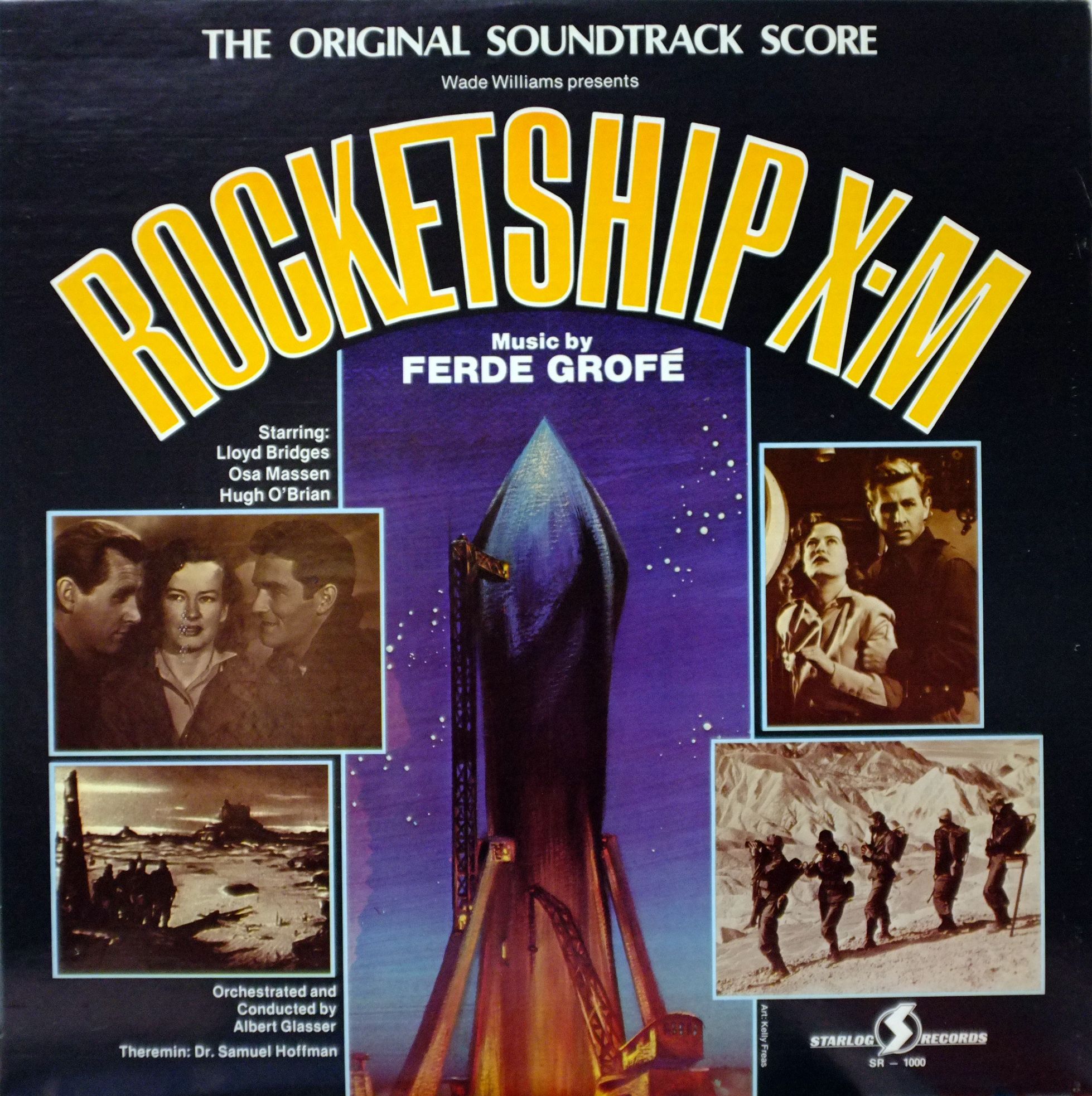 Starlog Records was sparked by a suggestion from composer and orchestrator Albert Glasser, who thought it might be a good idea if Starlog magazine people initiated a recording of Ferde Grofé’s “lost” score for ROCKETSHIP X-M (1950), which Glasser himself had orchestrated and had a personal desire to see recorded. Glasser knew where the original tapes of that score were kept, and also knew who should be contacted in order to obtain them. His suggestion and assistance ultimately resulted in the release of Starlog’s first recording, in 1977. The soundtrack album (SR-1000), reproduced from the original studio tapes, was at first available only through mail from Starlog [magazine], but retail distribution was eventually arranged.
Starlog Records was sparked by a suggestion from composer and orchestrator Albert Glasser, who thought it might be a good idea if Starlog magazine people initiated a recording of Ferde Grofé’s “lost” score for ROCKETSHIP X-M (1950), which Glasser himself had orchestrated and had a personal desire to see recorded. Glasser knew where the original tapes of that score were kept, and also knew who should be contacted in order to obtain them. His suggestion and assistance ultimately resulted in the release of Starlog’s first recording, in 1977. The soundtrack album (SR-1000), reproduced from the original studio tapes, was at first available only through mail from Starlog [magazine], but retail distribution was eventually arranged.
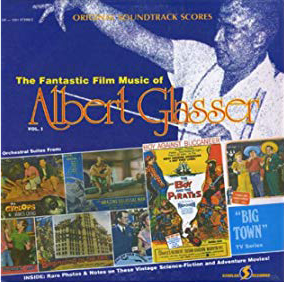 Due to Glasser’s participation in the Grofé recording, it was fitting that Starlog’s second release was a collection of music from science fiction and adventure films composed by Glasser himself. The Fantastic Film Music of Albert Glasser (SR-1001), as with ROCKETSHIP X-M, was a valuable recording for collectors, as it contained music from motion pictures that had never before been available on record, and offered a look at Glasser’s important musical contribution to fantastic films. With themes and suites, also taken from the original tapes, from THE AMAZING COLOSSAL MAN, THE CYCLOPS, BEGINNING OF THE END, THE CISCO KID, BIG TOWN, THE BOY AND THE PIRATES, THE BUCKSKIN LADY, and TOP OF THE WORLD, the album enabled listeners to appreciate such music to a much greater extent that had been in the films themselves or on the few previously recorded collections of similar music.
Due to Glasser’s participation in the Grofé recording, it was fitting that Starlog’s second release was a collection of music from science fiction and adventure films composed by Glasser himself. The Fantastic Film Music of Albert Glasser (SR-1001), as with ROCKETSHIP X-M, was a valuable recording for collectors, as it contained music from motion pictures that had never before been available on record, and offered a look at Glasser’s important musical contribution to fantastic films. With themes and suites, also taken from the original tapes, from THE AMAZING COLOSSAL MAN, THE CYCLOPS, BEGINNING OF THE END, THE CISCO KID, BIG TOWN, THE BOY AND THE PIRATES, THE BUCKSKIN LADY, and TOP OF THE WORLD, the album enabled listeners to appreciate such music to a much greater extent that had been in the films themselves or on the few previously recorded collections of similar music.
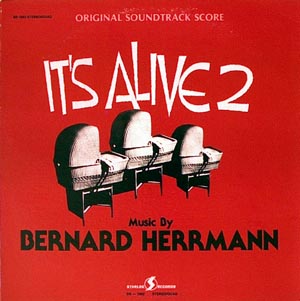 Starlog’s third recording – and [most] current, as of this writing – is that of Bernard Herrmann’s posthumous score for IT’S ALIVE 2 (SR-1002), which features the same music utilized in its predecessor, IT’S ALIVE (scored shortly before the composer’s death, [arranged and expanded by Herrmann’s friend and colleague, Laurie Johnson]). Herrmann’s powerful score, never recorded before (although there was an unsuccessful attempt made by the Entr’Acte Recording Society), was definitely worthy of pressing, and [Starlog’s “Original Soundtrack Score”] edition has the added quality of being newly [re-]recorded in full 4-channel SQ Quadraphonic sound. With Herrmann being one of the most respected composers in the fantastic genre, Starlog’s recording comes as a valuable contribution in the preservation of his music.
Starlog’s third recording – and [most] current, as of this writing – is that of Bernard Herrmann’s posthumous score for IT’S ALIVE 2 (SR-1002), which features the same music utilized in its predecessor, IT’S ALIVE (scored shortly before the composer’s death, [arranged and expanded by Herrmann’s friend and colleague, Laurie Johnson]). Herrmann’s powerful score, never recorded before (although there was an unsuccessful attempt made by the Entr’Acte Recording Society), was definitely worthy of pressing, and [Starlog’s “Original Soundtrack Score”] edition has the added quality of being newly [re-]recorded in full 4-channel SQ Quadraphonic sound. With Herrmann being one of the most respected composers in the fantastic genre, Starlog’s recording comes as a valuable contribution in the preservation of his music.
Starlog Records is maintained by two gentlemen: Starlog magazine publisher Kerry O’Quinn, who originated the recording propjet after Albert Glasser’s initial suggestion, and Tom O’Steen, who was later brought in as Special Projects Director. Mr. O’Steen gathers the necessary photos, copy information, and memorabilia for each project, as well as scheduling studio sessions and deadline requirements for cover art and pressing. Mr. O’Quinn is responsible for the entire design of the project, including jacket layout and art, and the important liner notes included with each album. Beyond these two individuals heading up the recording project, other technicians are called in to help on the individual recordings.
As Starlog attempts to make available film music not before recorded, a number of stumbling blocks must first be overcome. One of the biggest of these problems is simply in locating the material they wish to record. Often the music has been lost or destroyed by the studio, or no one knows who holds the copyright on the score. Once the tapes or written music have been located, the record producers must obtain the music rights from the studios or present owners. This requires lawyers and contracts, and is no simple project. In an interview with this author, Special Projects Director Tom O’Steen explained that “it is hard to set up a step-by-step relationship (with any of the various agencies involved) because so many steps have to be done” at the same time.
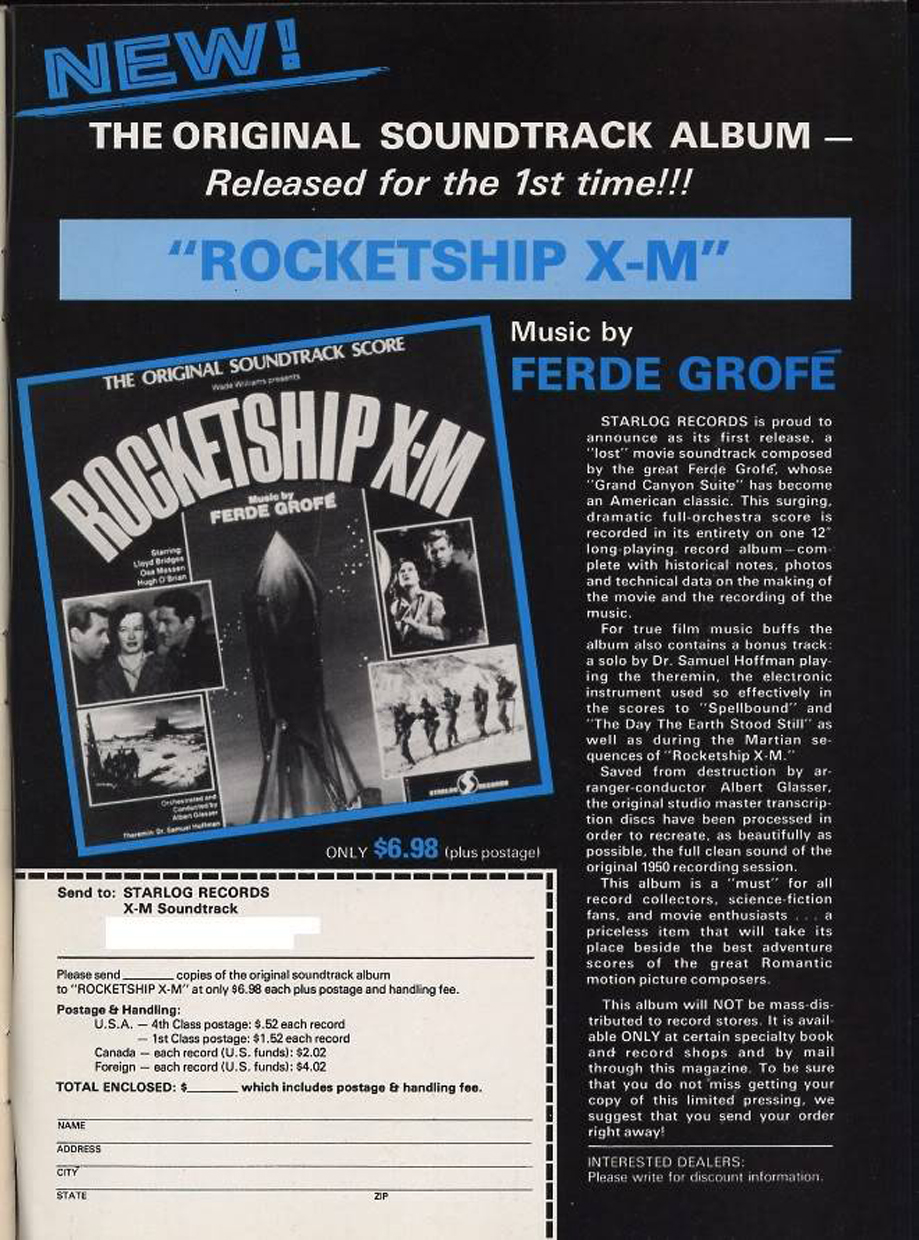
After the album has been recorded and pressed, the next major problem Starlog encounters – and probably the most important in regard to the success of the album – is its distribution. The album bust be promoted and made sufficiently available to an audience to be reached and maintained. Starlog is currently negotiating with a national distribution arrangement, which will result in far greater availability of their recordings than was possible during their first releases [In 1980, Starlog joined with Varese Sarabande Records to co-produce and distribute LPs in the joint “Soundtrack Series” – label numbers SV-95001+].Beyond the endless paperwork necessary to establish precisely the correct copyright restrictions, Starlog must then begin a tedious administrative battle with the Musicians Union, which demands enormous re-use fees and musician salaries. In many cases, these costs are so prohibitive that certain scores can never be recorded [onto LP], simply because to obtain the necessary legal and technical elements to record would cost too much for a small company like Starlog to consider feasible. In some cases, as Mr. O’Steen points out, it is less expensive to have the score re-recorded in England, since the English Musicians Union fees are far less than in the US.
Starlog has several projects in mind to follow the IT’S ALIVE 2 album. These ideas may or may not materialize, depending upon the [success] of obtaining the materials and translating them into mass-produced LPs. Mr. O’Steen would like to do new recordings of Leith Stevens’ classic scores for THE WAR OF THE WORLDS and WHEN WORLDS COLLIDE and also plans a collection of the fantasy film music of Les Baxter, probably containing music from the AIP Poe films. Mr. O’Steen is also attempting to arrange a project with 20th Century Fox to release several of their scores, including Leonard Rosenman’s FANTASTIC VOYAGE, and Bernard Herrmann’s JOURNEY TO THE CENTER OF THE EARTH. These projected recordings, however, will remain in the planning stages until the interest and response generated by the first there albums can be analyzed. *
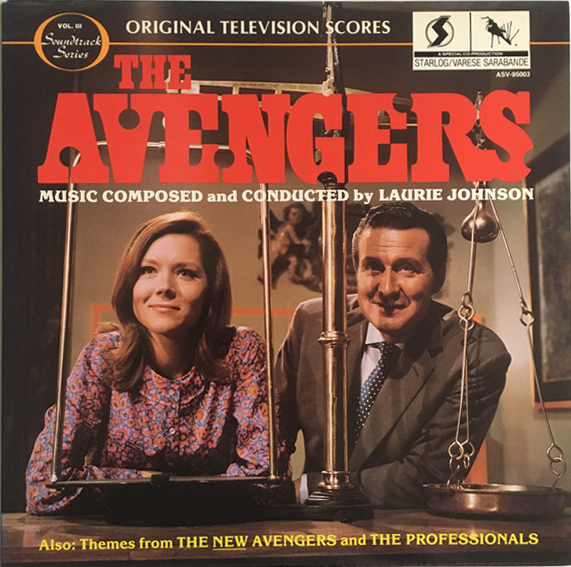 While the commercial success of Starlog Records remains to be seen, die-hard collectors of film music in general – and science fiction/fantasy film music in particular – owe a debt of gratitude to the people at Starlog for presenting such hitherto unavailable soundtracks for our enjoyment and collection. There is a whole world of unique music extant within the fantastic cinema, the majority of which has never been recorded or significantly recognized. It is hoped that Starlog will be able to overcome the legal red-tape and union restrictions in order to continue presenting the film music world with some of the soundtracks we have never had the chance to adequately appreciate.
While the commercial success of Starlog Records remains to be seen, die-hard collectors of film music in general – and science fiction/fantasy film music in particular – owe a debt of gratitude to the people at Starlog for presenting such hitherto unavailable soundtracks for our enjoyment and collection. There is a whole world of unique music extant within the fantastic cinema, the majority of which has never been recorded or significantly recognized. It is hoped that Starlog will be able to overcome the legal red-tape and union restrictions in order to continue presenting the film music world with some of the soundtracks we have never had the chance to adequately appreciate.
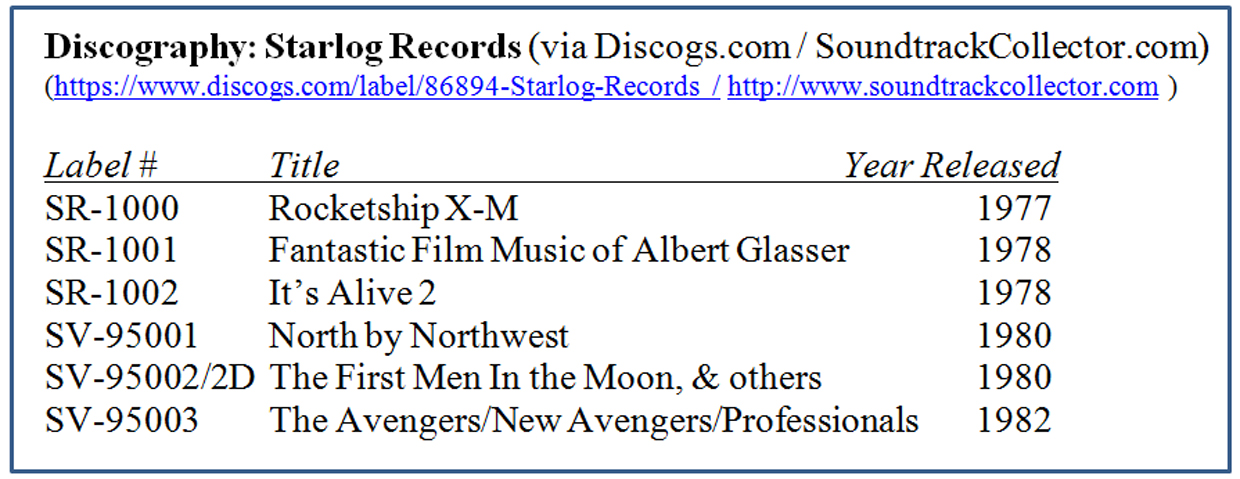
* Except for NORTH BY NORTHWEST, these ambitions were unfulfilled by Starlog Records, but all have been since issued by various labels in the CD era.
Further Information: For an extensive recent interview with Kerry O’Quinn about the Starlog Records days, see this article at KQEK.com

